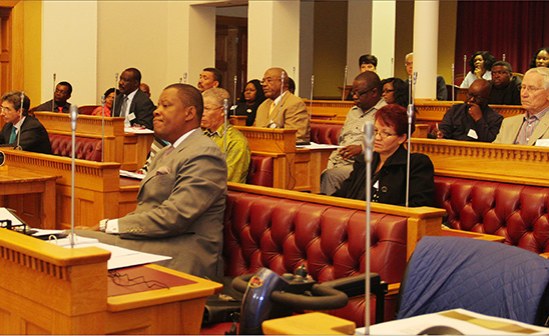Once the recently submitted national budget is unpacked, it becomes clear that only 12% of the allocated funds will be directed to the construction of roads, schools, hospitals, water, electricity and rural infrastructure. These are the items Namibians need most, said Fenny Nannieni of Swapo Congress.
She urged Namibia to ensure that it directly supports capital formation rather than consumption, and said, “We cannot escape the development gap, especially when funds are used to fund current repetitive costs rather than serve the future.”
“The increased allocation of development budgets is remarkable and I praise that minister, but we must not ignore the growing gaps in our consumption, what we owe, and what we build. In the third year’s execution, the development vote is still delaying both operating costs and debt services.”
The youthful lawmaker added that the budget ratio shows that debt and salaries take priority over key social and developmental infrastructure and job creation.
“This is not sustainable as development budgets are our most important tool for unlocking comprehensive socio-economic development and economic opportunities,” she said.
Nannyeni also warned that youth goals would not be able to be achieved without strong and consistent development budget allocations.
Also joining the debate on the national budget, Republican Congressman Matthias Mbundu was particularly concerned about how Namibia could face the current unemployment crisis without addressing the gap in skills and knowledge that exists in the education sector.
“We recapture the question of how our natural resources benefit unemployed, literary, illiterate citizens, as most graduates become unemployed or overskilled because the existing job market cannot absorb them.
He further argued that Namibian national wallets are heavily dependent on what the International Monetary Fund (IMF), the World Bank and other international organizations have directed that they are good or bad for Namibians.
Describing the IMF’s impact as “overwhelming,” Mbundu said that normal hardworking, unemployed Namibians would not be interested in the Global Economic Outlook (WEO) for each fiscal year unless they directly improve their living conditions.
“Our people are looking for practical solutions to everyday struggles, including daily meals for their kids, decent income that they can save for the festive season with their loved ones.
Continuing budget debate, he praised the introduction of a cash voucher system to replace the food relief and distribution program led by the Prime Minister’s Office.
Sign up for the AllAfrica newsletter for free
Get the latest African news
success!
Almost finished…
You need to check your email address.
Follow the instructions in the email you sent to complete the process.
error!
There was a problem processing the submission. Please try again later.
“This was a complaint that my former colleague defended the current speaker while leading the OPM, indicating that the government is actually listening to the advice of the House of Representatives this August.
However, Mbundu said he hopes that the country’s budget will face what is called the elephant in the room: the distribution of wealth through what is called Namibia’s natural resources and minerals, economically aligned skills development and job creation.
Newly appointed Finance Minister Erika Shahuda recently presented a cautious, conservative yet pro-promoting budget of $10006.3 billion for fiscal year 2025/26. The largest budget allocation was awarded to N$24.8 billion, N$14.6 billion in finance and N$12.3 billion in health education.
The budget is presented under the theme of “For a future that has thrived beyond 35” and represents a 4.9% increase from the revised estimate for the previous year. -ebrandt@nepc.com.na

